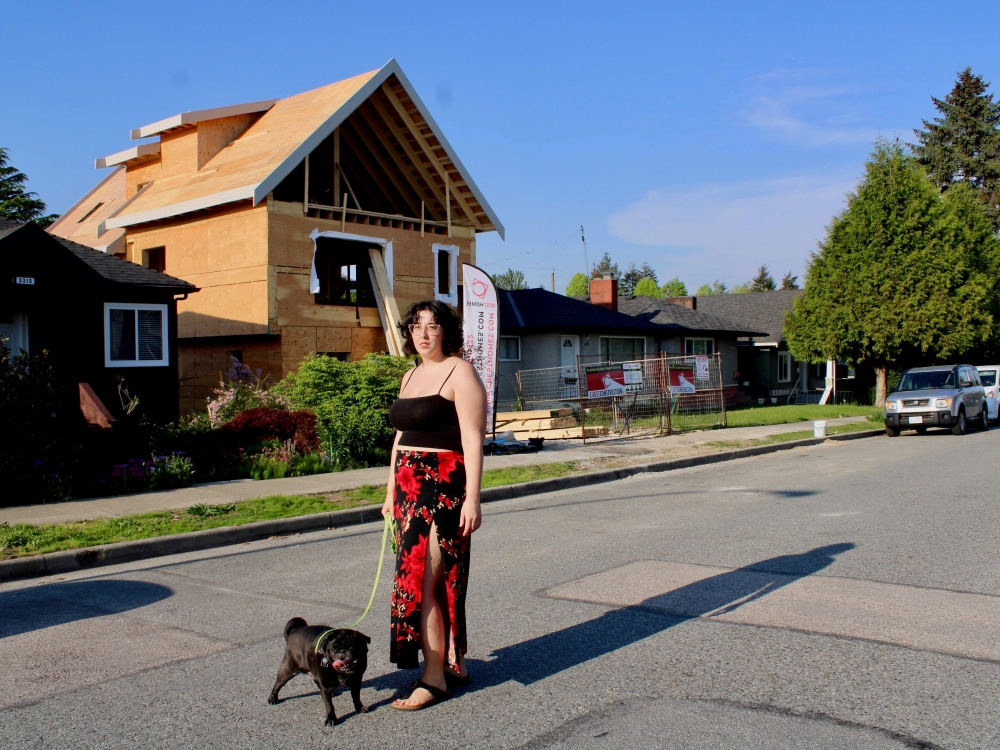Megan Milton got an eviction notice in February 2020, right before the pandemic hit. The family whose basement suite she rented had decided to sell their house, and the new owner said she wanted to move her son into the suite.
It was impossible to find a new home as the world shut down to prevent the spread of COVID-19, so Milton moved in with three friends who were sharing a rented house. For two years, Milton slept in the dining room. Then she and her roommates were evicted again, this time because the owner wanted to tear down the house and build a bigger single-family home.
Milton is now 32 and works for UBCP/ACTRA, a union that represents professional performers. She said she’s been evicted seven times since moving into her own place at age 18.
“I’ve been an early victim of the housing crisis,” she said. “And it’s just getting worse and worse.”
Milton’s experience of being evicted multiple times is common in British Columbia. A new report by UBC researchers highlights just how frequently tenants are evicted by landlords who say they want to renovate, redevelop or move a family member into the unit.
Between April 2016 and April 2021 in B.C., their findings show that more than one in 10 tenant households — 10.5 per cent — have experienced an eviction.
Nationally, 5.9 per cent of tenant households experienced an eviction in that five-year period, far lower than B.C.’s rate. The country’s most populous provinces, Ontario and Quebec, don’t come close to B.C.’s either, with eviction rates of 6.1 and 4.8 per cent respectively.
This makes B.C.’s eviction rate the highest in Canada.
Who triggers evictions?
For years, the only eviction data available was collected by government agencies, such as B.C.’s Residential Tenancy Branch, when they were directly involved in an eviction process. The majority of these formal disputes find that tenants are at fault for their eviction. For example, according to Toronto data between 2010 and 2018, 75 per cent of evictions were due to late rent payments.
But this data leaves out the many evictions that are settled outside of a quasi-judicial dispute resolution process where a tenant did not formally challenge the landlord, say the researchers.
In 2018, Statistics Canada began conducting its Canadian Housing Survey. Like the census, the survey is self-reported by households.
“This is the only national source of evictions data we can look at,” said geographer Craig Jones, the associate director of UBC’s Housing Research Collaborative.
Thanks to the bi-annual survey, there is increasing understanding of the landscape of evictions in Canada. Jones’ team has been making use of the survey since its inception and used it to produce the recent report on evictions.
The Statistics Canada data produced a radically different finding compared to the data collected through formal disputes: about 65 per cent of evictions in Canada are triggered by the landlord.
Comparing eviction data between provinces, B.C. landlords are in the lead, initiating 85.4 per cent of evictions.
“It’s not that we have a higher eviction rate in B.C. because we have more bad tenants — that’s pretty clear,” said Jones.
During the five-year survey period, only 15 per cent of households evicted were categorized as “at-fault,” with the tenant behind on payments, damaging the property or causing a disturbance.
Of the vast majority of tenant households who were at “no-fault,” the leading cause of eviction is the sale of the property by the landlord.
The second most common cause is the landlord wanting the property for their own use. Jones suspects the size of B.C.’s large secondary rental market — people renting a condo apartment or in a house as opposed to a unit in a purpose-built rental building — is behind the province’s high rate of evictions triggered by a landlord wanting their property back. Over 42 per cent of Metro Vancouver tenants, for example, live in condos rented from landlord investors, the highest percentage of all urban communities in Canada.
Milton’s recent evictions were a combination of both of these factors: her landlord sold the house where she was renting a basement suite, and then the new owner wanted to use the suite to house her son.
The data showed that tenants living in housing owned by non-profits, co-ops or government agencies were less likely to experience eviction. More of this non-market housing needs to be built, says researcher Jones.
The survey covered April 2016 to April 2021, with over a year of tenant data collected during the pandemic. While provincial governments implemented eviction bans to prevent displacement, evictions were accelerated as soon as they were lifted, according to the researchers. There are also reports of tenants being evicted during eviction bans.
Examining differences between demographic groups, the researchers found that Indigenous tenants have a high eviction rate during the five-year period. Ten per cent of Indigenous tenant households experienced evictions, compared to six per cent experienced by non-Indigenous households.
Life satisfaction and mental health were also significantly lower for tenants who had experienced eviction compared to those who had not, according to survey responses.
As for the reasons behind evictions, the report points to research that shows a rise of housing treated as investment assets. About 20 per cent of purpose-built rental units are owned by financial firms. Around the same percentage of condos and houses are owned by investors who do not live in them.
Where to rent in an eviction capital?
Now living in the Renfrew neighbourhood on Vancouver’s east side — and surrounded by construction cranes — Milton is nervous about being evicted yet again.
She joined the Vancouver Tenants Union to push the B.C. government to better protect tenants, and she’s calling for much better enforcement of evictions for landlords’ use of property, which many property owners abuse.
“[Government] absolutely is never going to support renters, unless renters actually stand up for themselves,” Milton said.
In 2017, the B.C. government tweaked the rules to increase the amount of compensation tenants can get — from two months of rent to 12 months — if the tenant refutes that the stated purpose of an order to end tenancy was met, and the landlord is unable to prove otherwise. But it's still ultimately up to the decision of an arbitrator, and the tenant to file a claim and gather evidence. Milton has friends who have resorted to hiring private investigators in order to build their case.*
Like many tenants, owning a dog also made it more difficult for Milton to find a new rental, because landlords are allowed to exclude pets.
She’s also calling for vacancy control: tying rent increases to the rental unit, not the tenant. Currently, when tenants move out, landlords can raise the rent as much as they want — leading to a strong profit motive to find a way to evict tenants.
And while Milton supports the construction of more purpose-built rentals — which have stronger tenant protections than the secondary market — she says those homes need to be more affordable for people who live and work in the Lower Mainland.
When Milton and her roommates looked for a purpose-built apartment recently, it was almost impossible to find anything within their budget of $1,200 per bedroom.
“We spent the last few decades defunding social housing,” Milton said of the federal government’s retreat from financially supporting the construction of new social housing since 1993. “Now people are having to look at the secondary market, and it's a bunch of amateurs acting as landlords. It puts people at a massive disadvantage.” ![]()
Read more: Rights + Justice, Housing

















Tyee Commenting Guidelines
Comments that violate guidelines risk being deleted, and violations may result in a temporary or permanent user ban. Maintain the spirit of good conversation to stay in the discussion and be patient with moderators. Comments are reviewed regularly but not in real time.
Do:
Do not: